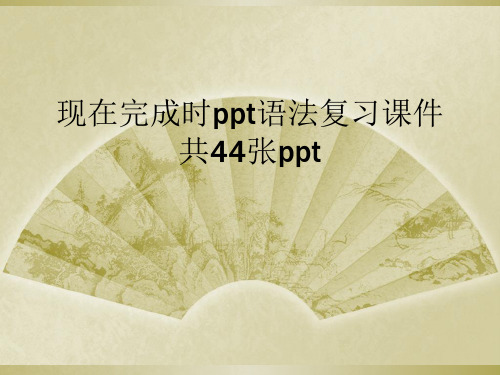现在完成时复习课件
合集下载
初二人教英语现在完成时态课件(共25张PPT)

常见非延续性动词和延续性动词的转变
❖ arrive/come/go to be in
die
be dead
❖ become a
be a borrow
keep
❖ Leave/ move
be away / be out
❖ buy
have open
be open
❖ join
be in/a member of
5. --How many times _h_a_v_e____ you __r_e_a_d___ (read) this book?
❖ --I _h_a_v_e_r_e_a_d_ (read) it several times.
6. My brotherb_ou_g_h_t____ (buy) a car last month.
❖ The twins have joined the army. (since they are 18years old) The twins have been soldiers/ been in the army since they are 18years old.
-- When c_a_m_e_____ she _________ (come)? -- She ________ (come) just now.
I lived there 2 years ago
past
present
I have lived here for two years
❖ 1.都表示过去发生的事 ❖ 2.现在完成时强调过去和现在的联系,不能和具
定回答) He has already finished a story book.
4.He finished reading a story- book. (改成现在完成时)
现在完成时(23张PPT)

用法
现
在
构成
完
成
标志词
时
重难点
情境导入
Hello, Ken! Have you just been to the cinema?
Hi, George! Yes, I have.
一、用法
现在完成时的两种主要用法
moved here had20b1r5eakfast
I’mI sntoiltl hliuvne ghreyrenow
have __n_e_v_e_r_______ seen it.”
5. “Has the bus left _y_e_t_________?” “Yes, it has
______a_lr_e_a_d_y___ left.”
三、标志词
2. since 和for 的区别
注:since 和for 的区别 • since后+时间点,如:2001,yesterday,
三、标志词 play basketball; for 3 years A: How longh_a_v_e__ you p_l_a_y_e_d_b_a_s_k_e_t_b_a_l_l ? B: Ih_a_v_e_p__la_y_e_d_ it_fo_r__3_y_e_a_r_s__. use this book; since 2017 A: How long _h_a_s_ Bill _u_s_e_d__th_i_s_b_o_o_k_ ? B: He _h_a_s__u_s_ed_ it _s_in_c_e__2_0_1_7_. know your best friend; since last year A: How long __h_a_v_e you k_n_o_w__n_y_o_u__r_b_e_s_t_f_riend__ ? B: I _h_a_v_e_k__n_o_w_n_ her/him _s_in_c_e__la_s_t_y_e_a_r_.
现
在
构成
完
成
标志词
时
重难点
情境导入
Hello, Ken! Have you just been to the cinema?
Hi, George! Yes, I have.
一、用法
现在完成时的两种主要用法
moved here had20b1r5eakfast
I’mI sntoiltl hliuvne ghreyrenow
have __n_e_v_e_r_______ seen it.”
5. “Has the bus left _y_e_t_________?” “Yes, it has
______a_lr_e_a_d_y___ left.”
三、标志词
2. since 和for 的区别
注:since 和for 的区别 • since后+时间点,如:2001,yesterday,
三、标志词 play basketball; for 3 years A: How longh_a_v_e__ you p_l_a_y_e_d_b_a_s_k_e_t_b_a_l_l ? B: Ih_a_v_e_p__la_y_e_d_ it_fo_r__3_y_e_a_r_s__. use this book; since 2017 A: How long _h_a_s_ Bill _u_s_e_d__th_i_s_b_o_o_k_ ? B: He _h_a_s__u_s_ed_ it _s_in_c_e__2_0_1_7_. know your best friend; since last year A: How long __h_a_v_e you k_n_o_w__n_y_o_u__r_b_e_s_t_f_riend__ ? B: I _h_a_v_e_k__n_o_w_n_ her/him _s_in_c_e__la_s_t_y_e_a_r_.
现在完成时态复习课件PPT课件

2.过去已经开始,持续到现在的动作或状态
I have lived here for three years. I have lived here since 2010/three years ago.
Eg: I __h_a_v_e__le_a_r_n_t_ (learn) English for three years.
一:中考考题分析 现在完成时在河南中考命题中的规律:主要以选择题的形式出现。 二:复习目标:
1、复习现在完成时态的构成、用法及相关的时间状语。 2、巩固规则动词过去式及过去分词的变化规则。 3、熟练掌握并正确运用现在完成时态,(非延续性动词与一段时间连用时与
延续性动词的转变是重点)。
• 精选
现在完成时考点解析
• 精选Biblioteka 时态的选择,时间状语是关键
现在完成时态句中常见的时间状语
A:这类词常强调动作完成。
already(已经,还,肯定句)
yet(否定句,疑问句)
never(从来没有) ever (曾经)
twice (两次)
recently(近来)
before(句末)
just (刚刚)
2011安徽 He promised to pick me up at the school gate.
13、说to实be在h的onest
4、两a 个co,up一le对o,f 几个
14、把re.g..a视rd为...a. s
5、数th以ou千sa计n的ds of
15、根ac据cording to
6、数m以illi百on万s的of 7、全all年y,ea终r r年ound 8、m许a多n甜y s蜜w的ee回t m忆emories 9、察ch看ec,k观ou察t 10、清理,丢掉
I have lived here for three years. I have lived here since 2010/three years ago.
Eg: I __h_a_v_e__le_a_r_n_t_ (learn) English for three years.
一:中考考题分析 现在完成时在河南中考命题中的规律:主要以选择题的形式出现。 二:复习目标:
1、复习现在完成时态的构成、用法及相关的时间状语。 2、巩固规则动词过去式及过去分词的变化规则。 3、熟练掌握并正确运用现在完成时态,(非延续性动词与一段时间连用时与
延续性动词的转变是重点)。
• 精选
现在完成时考点解析
• 精选Biblioteka 时态的选择,时间状语是关键
现在完成时态句中常见的时间状语
A:这类词常强调动作完成。
already(已经,还,肯定句)
yet(否定句,疑问句)
never(从来没有) ever (曾经)
twice (两次)
recently(近来)
before(句末)
just (刚刚)
2011安徽 He promised to pick me up at the school gate.
13、说to实be在h的onest
4、两a 个co,up一le对o,f 几个
14、把re.g..a视rd为...a. s
5、数th以ou千sa计n的ds of
15、根ac据cording to
6、数m以illi百on万s的of 7、全all年y,ea终r r年ound 8、m许a多n甜y s蜜w的ee回t m忆emories 9、察ch看ec,k观ou察t 10、清理,丢掉
现在完成时课件

详细描述
现在完成时可以用来描述一个动作从过去开始,一直持续到 现在,并且有可能继续下去。例如,“我已经学习英语三年 了。”这句话表示“学习英语”这个动作从三年前开始,一 直持续到现在,并且还有可能继续下去。
动作发生在过去,但与现在无关
总结词
表示某个动作发生在过去,与现在的情况无关。
详细描述
现在完成时也可以用来描述一个动作发生在过去,与现在的情况无关。例如,“我已经去过美国了。”这句话表 示“去美国”这个动作发生在过去,与现在的情况(如是否在美国)无关。
与already, just, yet等副词连用
表示动作或状态已经完成或尚未完成。
现在完成时可以与already, just, yet等副词连用,表示某个动作或状态已经完成或尚未完成。例如, “I have already finished my homework.”(我已经完成了作业。)“He hasn't yet arrived.”( 他还没到。)
表示某个动作对现在的情况有影响。
详细描述
现在完成时也可以用来描述某个动作 对现在的情况有影响。例如,“我已 经结婚了。”这句话表示“结婚”这 个动作已经完成,并且对现在的情况 (如婚姻状态)有影响。
动作发生在过去,持续到现在,并有可能持续下去
总结词
表示某个动作从过去开始,一直持续到现在,并且有可能继 续下去。
填空题2
She has read the book. She _______ it before the summer holiday.
翻译题练习
要点一
翻译题1
我已经完成了作业。
要点二
翻译题2
他们已经到达了机场。
THANKS
感谢观看
现在完成时可以用来描述一个动作从过去开始,一直持续到 现在,并且有可能继续下去。例如,“我已经学习英语三年 了。”这句话表示“学习英语”这个动作从三年前开始,一 直持续到现在,并且还有可能继续下去。
动作发生在过去,但与现在无关
总结词
表示某个动作发生在过去,与现在的情况无关。
详细描述
现在完成时也可以用来描述一个动作发生在过去,与现在的情况无关。例如,“我已经去过美国了。”这句话表 示“去美国”这个动作发生在过去,与现在的情况(如是否在美国)无关。
与already, just, yet等副词连用
表示动作或状态已经完成或尚未完成。
现在完成时可以与already, just, yet等副词连用,表示某个动作或状态已经完成或尚未完成。例如, “I have already finished my homework.”(我已经完成了作业。)“He hasn't yet arrived.”( 他还没到。)
表示某个动作对现在的情况有影响。
详细描述
现在完成时也可以用来描述某个动作 对现在的情况有影响。例如,“我已 经结婚了。”这句话表示“结婚”这 个动作已经完成,并且对现在的情况 (如婚姻状态)有影响。
动作发生在过去,持续到现在,并有可能持续下去
总结词
表示某个动作从过去开始,一直持续到现在,并且有可能继 续下去。
填空题2
She has read the book. She _______ it before the summer holiday.
翻译题练习
要点一
翻译题1
我已经完成了作业。
要点二
翻译题2
他们已经到达了机场。
THANKS
感谢观看
《现在完成时态》ppt课件

REPORT
现在完成时态
CATALOG
DATE
ANALYSIS
SUMMARY
目录
CONTENTS
• 现在完成时态的定义 • 现在完成时态的用法 • 现在完成时态与一般过去时的区别 • 现在完成时态的特殊用法 • 现在完成时态的练习与解析
REPORT
CATALOG
DATE
ANALYSIS
SUMMAR Y
翻译练习
总结词
跨文化理解
总结词
句型转换能力
详细描述
通过将英文句子翻译成中文,学生可以更 好地理解现在完成时态在中文表达中的对 应形式,促进跨文化交流和理解。
详细描述
翻译练习不仅要求学生掌握时态的转换, 还需要注意句型的变化和语言的流畅性, 有助于提高学生的语言运用能力。
REPORT
THANKS
感谢观看
用于描述过去发生的某个事件或经历, 并强调该事件或经历对现在的影响或 结果。
用于表达对过去某个时间点或时期的 情况的回忆或回顾。
REPORT
CATALOG
DATE
ANALYSIS
SUMMAR Y
03
现在完成时态与一般过 去时的区别
时间点的区别
01
过去时描述过去某个时间点发生 的事情,强调事情发生的时间点 。
CATALOG
DATE
ANALYSIS
SUMMAR Y
这个句子中的“Have you seen” 表示询问对方是否已经完成了动 作“看电影”,强调了动作的完
成状态。
REPORT
CATALOG
DATE
ANALYSIS
ቤተ መጻሕፍቲ ባይዱ
SUMMAR Y
05
现在完成时态
CATALOG
DATE
ANALYSIS
SUMMARY
目录
CONTENTS
• 现在完成时态的定义 • 现在完成时态的用法 • 现在完成时态与一般过去时的区别 • 现在完成时态的特殊用法 • 现在完成时态的练习与解析
REPORT
CATALOG
DATE
ANALYSIS
SUMMAR Y
翻译练习
总结词
跨文化理解
总结词
句型转换能力
详细描述
通过将英文句子翻译成中文,学生可以更 好地理解现在完成时态在中文表达中的对 应形式,促进跨文化交流和理解。
详细描述
翻译练习不仅要求学生掌握时态的转换, 还需要注意句型的变化和语言的流畅性, 有助于提高学生的语言运用能力。
REPORT
THANKS
感谢观看
用于描述过去发生的某个事件或经历, 并强调该事件或经历对现在的影响或 结果。
用于表达对过去某个时间点或时期的 情况的回忆或回顾。
REPORT
CATALOG
DATE
ANALYSIS
SUMMAR Y
03
现在完成时态与一般过 去时的区别
时间点的区别
01
过去时描述过去某个时间点发生 的事情,强调事情发生的时间点 。
CATALOG
DATE
ANALYSIS
SUMMAR Y
这个句子中的“Have you seen” 表示询问对方是否已经完成了动 作“看电影”,强调了动作的完
成状态。
REPORT
CATALOG
DATE
ANALYSIS
ቤተ መጻሕፍቲ ባይዱ
SUMMAR Y
05
现在完成时ppt课件

详细描述
例如,“他昨天正在巴黎旅行”是过去进行时,强调昨天正在进行的动作,而“ 他已经去了巴黎”是现在完成时,强调现在已完成去巴黎的动作及其对现在的影 响。
05 现在完成时的常见错误
混淆现在完成时和一般现在时
总结词
混淆现在完成时和一般现在时是常见的语法错误之一。
详细描述
现在完成时表示过去发生的动作对现在造成的影响或结果,而一般现在时则表示通常或反复发生的动作。两者的 区别在于现在完成时涉及时间上的“过去-现在”联系。
详细描述:现在完成时是英语语法中的一种时态,表示 过去发生的动作对现在造成的影响或结果。以下是现在 完成时的基本用法练习题
2. They have ______ a race.
3. She has ______ a headache.
答案: 1. written 2. run 3. had
现在完成时的特殊用法练习题
有些动词的过去分词形式是 不规则的,需要单独记忆, 例如go变成gone,write变 成written等。
02 现在完成时的基本用法
肯定句的用法
总结词
现在完成时在肯定句中通常用来表示动作在 过去已经完成,但对现在仍有影响。
详细描述
使用现在完成时,我们能够表达一个动作或 状态在过去已经发生或存在,但这个动作或
总结词:现在完成时的特殊用法练习 题
01
详细描述:除了基本用法外,现在完 成时还有许多特殊用法。以下是现在
完成时的特殊用法练习题
02
1. We have ______ in this school for three years.
03
Hale Waihona Puke 06答案: 1. been 2. bought 3. gone
例如,“他昨天正在巴黎旅行”是过去进行时,强调昨天正在进行的动作,而“ 他已经去了巴黎”是现在完成时,强调现在已完成去巴黎的动作及其对现在的影 响。
05 现在完成时的常见错误
混淆现在完成时和一般现在时
总结词
混淆现在完成时和一般现在时是常见的语法错误之一。
详细描述
现在完成时表示过去发生的动作对现在造成的影响或结果,而一般现在时则表示通常或反复发生的动作。两者的 区别在于现在完成时涉及时间上的“过去-现在”联系。
详细描述:现在完成时是英语语法中的一种时态,表示 过去发生的动作对现在造成的影响或结果。以下是现在 完成时的基本用法练习题
2. They have ______ a race.
3. She has ______ a headache.
答案: 1. written 2. run 3. had
现在完成时的特殊用法练习题
有些动词的过去分词形式是 不规则的,需要单独记忆, 例如go变成gone,write变 成written等。
02 现在完成时的基本用法
肯定句的用法
总结词
现在完成时在肯定句中通常用来表示动作在 过去已经完成,但对现在仍有影响。
详细描述
使用现在完成时,我们能够表达一个动作或 状态在过去已经发生或存在,但这个动作或
总结词:现在完成时的特殊用法练习 题
01
详细描述:除了基本用法外,现在完 成时还有许多特殊用法。以下是现在
完成时的特殊用法练习题
02
1. We have ______ in this school for three years.
03
Hale Waihona Puke 06答案: 1. been 2. bought 3. gone
现在完成时态课件

例如,“They has arrived.”(错误),应改为“They have arrived.”(正确)。
其他易错点提示
要点一
忘记在助动词后加动 词的过去分词形式
例如,“I have go to the park.” (错误),应改为“I have gone to the park.”(正确)。
感谢您的观看
不规则动词变化举例
be - was/were have - had
go - went
不规则动词变化举例
do - did see - saw
eat - ate
不规则动词变化举例
01
take - took
02
make - made
03
find - found
04
bring - brought
特殊情况处理技巧
例如
I have already finished my homework.(我已经完成我的作业了。)
否定句结构和用法
现在完成时态否定句的基本结构是
主语+have/has+not&# watched the movie yet.(她还没有看过那部电影。)
疑问句结构和用法
现在完成时态课件
contents
目录
• 现在完成时态基本概念 • 现在完成时态用法详解 • 动词变化规则及特殊情况处理 • 句子结构和用法举例 • 常见错误及注意事项 • 练习与巩固环节
01 现在完成时态基本概念
定义与用法
现在完成时态表示过去发生的动作对现在 造成的影响或结果,或表示从过去某个时 间点开始一直持续到现在的动作或状态。
经历与经验
现在完成时态还可以表示过去的经历或经验,这些经历或经验对现在的情况或 行为产生影响。例如,“He has traveled to many countries.”(他去过很多 国家。)
其他易错点提示
要点一
忘记在助动词后加动 词的过去分词形式
例如,“I have go to the park.” (错误),应改为“I have gone to the park.”(正确)。
感谢您的观看
不规则动词变化举例
be - was/were have - had
go - went
不规则动词变化举例
do - did see - saw
eat - ate
不规则动词变化举例
01
take - took
02
make - made
03
find - found
04
bring - brought
特殊情况处理技巧
例如
I have already finished my homework.(我已经完成我的作业了。)
否定句结构和用法
现在完成时态否定句的基本结构是
主语+have/has+not&# watched the movie yet.(她还没有看过那部电影。)
疑问句结构和用法
现在完成时态课件
contents
目录
• 现在完成时态基本概念 • 现在完成时态用法详解 • 动词变化规则及特殊情况处理 • 句子结构和用法举例 • 常见错误及注意事项 • 练习与巩固环节
01 现在完成时态基本概念
定义与用法
现在完成时态表示过去发生的动作对现在 造成的影响或结果,或表示从过去某个时 间点开始一直持续到现在的动作或状态。
经历与经验
现在完成时态还可以表示过去的经历或经验,这些经历或经验对现在的情况或 行为产生影响。例如,“He has traveled to many countries.”(他去过很多 国家。)
现在完成时(16张PPT)初中英语专项复习课件

考查现在完成时标志词。题1中,15 days为时间段, 选用for。题2、3中, 7 o’clock和1974为时间点,选 用since。
【典例2】My parents ________Nanjing twice.
A. have gone to B. have been to
C. have been in
易错点1 现在完成时常见标志词辨析
ever用于疑问句,意为“曾经”,位于句中 Have you ever eaten fish?
never含否定意义,意为“从不”,位于句中 I have never eaten fish.
易错点1 现在完成时常见标志词辨析
just多用于肯定句, 意为“刚刚”,位于句中 I have just had my lunch.
B. yet
C. ever
D. still
考查现在完成时标志词。句意:他曾去过上海吗? 由题目可知为现在完成时。根据句意“曾经”, 选用ever。
【典例5】Have you met Mr Li ______?
A. just
B. ago
C. before D. a moment ago
考查现在完成时标志词。句意:你以前见过李先生 吗?ago用于一般过去时,just用于句中,答案只能 选C。
before用于所有句式, 意为“……之前”,位于句末
She hasn’t seen you before.
易错点2 since/for用法辨析
since
since+时间点 He has lived in China since 1992.
since+ 时间段+ ago John has been a football player since 3 years ago.
【典例2】My parents ________Nanjing twice.
A. have gone to B. have been to
C. have been in
易错点1 现在完成时常见标志词辨析
ever用于疑问句,意为“曾经”,位于句中 Have you ever eaten fish?
never含否定意义,意为“从不”,位于句中 I have never eaten fish.
易错点1 现在完成时常见标志词辨析
just多用于肯定句, 意为“刚刚”,位于句中 I have just had my lunch.
B. yet
C. ever
D. still
考查现在完成时标志词。句意:他曾去过上海吗? 由题目可知为现在完成时。根据句意“曾经”, 选用ever。
【典例5】Have you met Mr Li ______?
A. just
B. ago
C. before D. a moment ago
考查现在完成时标志词。句意:你以前见过李先生 吗?ago用于一般过去时,just用于句中,答案只能 选C。
before用于所有句式, 意为“……之前”,位于句末
She hasn’t seen you before.
易错点2 since/for用法辨析
since
since+时间点 He has lived in China since 1992.
since+ 时间段+ ago John has been a football player since 3 years ago.
现在完成时完整版本ppt课件

4.Mr Green has worked here _s_in_c_e__ he came to China.
5.His grandpa has been dead __f_o_r__ several years.
.
14
严格执行突发事件上报制度、校外活 动报批 制度等 相关规 章制度 。做到 及时发 现、制 止、汇 报并处 理各类 违纪行 为或突 发事件 。
yet. 3.We __h_a_v_e_ never __s_e_en__ (see) this book
before.
5.Mother __h_a_s_ just _c_le_a_n_e_d_(clean) the house.
6.Sally _h_a_s__vi_s_it_e_d_(visit) China before.
.
18
严格执行突发事件上报制度、校外活 动报批 制度等 相关规 章制度 。做到 及时发 现、制 止、汇 报并处 理各类 违纪行 为或突 发事件 。
举例:
1.我买了这本书五年了。 I have bought this book for five years. ( F ) I have had this book for five years. ( T ) 2.这位老人已经死了十年了。 The old man has died for ten years. ( F ) The old man has been dead for ten years. ( T )
3. He hasn’t returned (not return) the book yet. 三、判断正误:(2分,每题1分)
1.他爷爷已经去世三年了。
His grandpa has died for 3 years.( F) 2. 他去过北京。
现在完成时ppt语法复习课件共44张ppt

Yes, I have done that already. ⑤ I’ve just finished my homework. ⑥ He has not come yet.
Exercises
• 1. I _h_a_v_e__h_a_d (have) lunch already. • 2. Has the train_a_r_r_i_v_e_d(arrive) yet? • 3.Tom _h_a_s_ never__b_e_e_n__ (be ) to China. • 4. The twin ___h_a_s_justs_e_e_n__(see) my father. • 5. The twins _s_a_w_(see) my father just now. • 6._h_a_v_e__ you ever _ri_d_d_e_n__(ride) a horse? Never.
通常与表示包括现在在内的时间副词 just (谓语动词之前) (刚 刚), already(已经(肯定句) ), before, yet(一般疑问(句 末) :已经;否定句:还) never, ever (疑问句) twice recently(近来)等状语连用
① I have never heard of that before. ② Have you ever ridden a horse? ③ She has already finished the work. ④ Have you milked the cow yet?
8._H_a__s__ he __se__e_n_(see) this film yet? No. When w__il_l __ he __se_e__(see) it? He w__il_l_s_e_eit tomorrow.
Exercises
• 1. I _h_a_v_e__h_a_d (have) lunch already. • 2. Has the train_a_r_r_i_v_e_d(arrive) yet? • 3.Tom _h_a_s_ never__b_e_e_n__ (be ) to China. • 4. The twin ___h_a_s_justs_e_e_n__(see) my father. • 5. The twins _s_a_w_(see) my father just now. • 6._h_a_v_e__ you ever _ri_d_d_e_n__(ride) a horse? Never.
通常与表示包括现在在内的时间副词 just (谓语动词之前) (刚 刚), already(已经(肯定句) ), before, yet(一般疑问(句 末) :已经;否定句:还) never, ever (疑问句) twice recently(近来)等状语连用
① I have never heard of that before. ② Have you ever ridden a horse? ③ She has already finished the work. ④ Have you milked the cow yet?
8._H_a__s__ he __se__e_n_(see) this film yet? No. When w__il_l __ he __se_e__(see) it? He w__il_l_s_e_eit tomorrow.
现在完成时的课件PPT

肯定句表达注意事项
01
注意区分现在完成时与一般过去时的用法,现在完成时 强调过去发生的动作对现在的影响,而一般过去时只表 示过去的某个动作或状态。
02
注意have/has的变形,当主语为第三人称单数时, have要变为has。
03
过去分词的变化规则需要掌握,包括规则变化和不规则 变化。
03 现在完成时否定句式
针对性辅导
拓展延伸
根据学生的实际情况,教师进行拓展 延伸,提供更多相关知识和练习题目 ,帮助学生进一步提高现在完成时的 运用能力。
针对学生在练习中暴露出的问题,教 师进行针对性辅导,帮助学生解决问 题。
1.谢谢聆 听
肯定句
主语 + have/has + 过 去分词 + 其他成分。
否定句
主语 + have/has + not + 过去分词 + 其 他成分。
疑问句
Have/Has + 主语 + 过去分词 + 其他成分 ?
简略回答
Yes, 主语 + have/has. 或 No, 主语 + haven't/hasn't.
否定句表达注意事项
注意区分现在完成时与一般过去时
现在完成时强调过去发生的动作对现在造成的影响或结果,而一般过去时只表示过去某个时间发生的 动作或存在的状态。
注意have/has的否定缩写形式
have not=haven't,has not=hasn't。
现在完成时疑问句式和回答方
04
式
疑问句构成及用法
特点
具有现在相关的时间参照点,强 调过去动作与现在的联系。
- 1、下载文档前请自行甄别文档内容的完整性,平台不提供额外的编辑、内容补充、找答案等附加服务。
- 2、"仅部分预览"的文档,不可在线预览部分如存在完整性等问题,可反馈申请退款(可完整预览的文档不适用该条件!)。
- 3、如文档侵犯您的权益,请联系客服反馈,我们会尽快为您处理(人工客服工作时间:9:00-18:30)。
• 注意:
–since和for的区别
• since后接时间点:如last term, yesterday, Monday, October“自从”…… • for后接一段时间:表示“长达多久”如ten短暂性 years, a while, two days等。 动词 (表示短暂意义的动词如buy, come, borrow, begin, die等,在完成时 中不能和表示一段时间的状语连用 而应变成相应的延续性动词)。
• ( B )1. —His grandfather _____ for two years? A died B has been dead C has died D has been died • ( c )2. Last year,Shenzhou-8 _____into space, It made us proud. • A. is sent B. was sent C. sent D. sends
D
B
B
step 4.现在完成时与一般过去时的 比较
• 1)一般过去时表示过去某时发生的动作或
单纯叙述过去的事情,强调动作;
•
I saw this boy yesterday
• 2)现在完成时为过去发生的,强调过去的 事情对现在的影响,强调影响。
I have seen this boy.
பைடு நூலகம்
• 2)一般过去时 常与具体的表示过去的时 间状语连用; • 现在完成时通常与模糊的时间状语连 用,或无时间状语。
• ( D )3.We ____xiao hu since she was a little girl. • A know B had known C knew D have known • ( A )5. —How happy the grandparents are! • —Yes , they _____for 50 years. • A. have been married B. have married C. have got married D. married
2)表示一次或多次的动作已经成为自己的经历。 I have been to water park 3)表示过去已经开始并一直持续到现在的动作 或状态。 We have studied NO.10 middle school for more than 2 years.
step 2.现在完成时的结构
否定句 I have not (haven’t) studied…. 疑问句 Have I studied…?
You have not (haven’t) Have you studied…? studied…. He has not (hasn’t) studied…. Has he studied…?
一般过去时的时间状语: yesterday, last
week,…ago, in1990, in October, just now, …-- 具体的时间状语
现在完成时的时间状:already,yet,before,for,
since, so far, ever, never, just, recently, twice,three times, for+一段时间, since +时 间点等状语连用。 … --模糊的时间状语
小结
比较have been to和have gone to
词组 have gone to
含义 到某地去了,表示 到了某地或正在去 某地的途中。说话 时该人不在现场 曾经去过某地,现 just, ever, 在已经不在那里了。 never
搭配
have been to
have been in
once, twice 在某地呆多长时间 since, for, how long
现在完成
八年级下册Unit9 Have you ever been to a museum?
复习目录
• 现在完成时态的概念 • 现在完成时态的结构 • 现在完成时态的句式 • 现在完成时态与一般过去式的比较 • 现在完成时态练习
step1.现在完成时的概念
1)表示过去发生或已完成的动作对现在造成 的影响或结果; I have already told them the story.
have been to/in和have gone to 的对比例题
• 1. lucy has _____ to Beijing. She will come back tomorrow. • A. been B. never been • C. went D. gone • 2. Hello, this is Mr. Green speaking. Can I speak to Mr. Black? • -- Sorry. He ______ the Park. • A. has been to B. has gone to • C. went to D. will go to • 3. --____ you ever ____ to the US? • -- Yes, twice. • A. Have, gone B. Have, been • C, Do, go D. were, going
• 现在完成时的构成:
• have/has + done
助动词 现在分词
• 注:动词的现在分词分为规则变化 与不规则变化.规则变化动词的现 在分词与过去式是一样的,不规则 变化的动词须特殊记忆。
step 3.现在完成时的句式
• 现在完成时的否定式直接在助动词have或has后 面加上not。 • 疑问句是把助动词提到主语之前。
按要求变化句式 1. I have been to Shanghai before. (改为否定句) I have not been to Shanghai before. 2.I have got something important to do .(改为一般 疑问句) Have you got anything important to do? 3.Have you ever buy the subway?(做否定回答) No,I haven ’t
